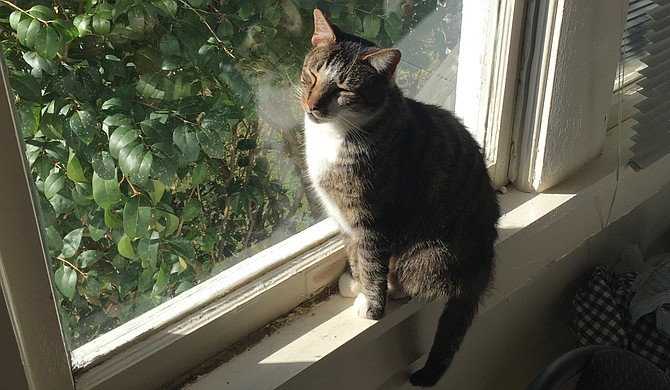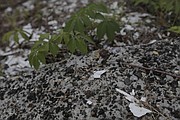Pets can also be subjected to lead in the home, especially if the paint is disturbed. Pets can ingest paint chips, sometimes found around the foundation of a home, especially when it is swept up into polling rainwater. Photo by Tim Summers Jr..
JACKSON — While the City of Jackson works on its corrosion-control study to prevent the presence of lead in the drinking water, residents are buying bottled water for themselves and their children, but what about the four-legged members of the family?
"You hear the reports of the lead in the water and Flint, and everyone is thinking obviously first about children and themselves," Karen Templeton, director of outreach at the Mississippi State University College of Veterinary Medicine, said. "But it goes further than that, it could be your pets too."
Templeton spoke over the phone April 13 about how to prevent pets from ingesting lead, even in small amounts, whether through drinking, licking or chewing.
"The same dangers for humans with lead is the same for animals," Templeton said. "If they were to lick the paint or drink water with lead in it, they would be at risk for the some damage as humans."
"If there is lead in water, you use purified water," Templeton said. "The younger that they are, the more susceptible they are, just like in humans. Whatever precautions that you are told to take as humans, you would use the same precautions with animals."
As for those precautions, such as providing your furry friend with purified or bottled water, residents can take steps to ensure that flakes of paint, especially off the side of older homes, don't wind up in the pools of water that pets frequently use to quench their thirst.
"Believe it or not, pets can be poisoned as easy or easier than children," Dennis Kelly, a lead-paint representative from the Mississippi Department of Environmental Quality, said. "I would suggest doing something along the drip line that would prevent the pets from getting to the water that accumulates there."
Kelly said that using landscaping to redirect the water is the best technique to ensure that pets did not lap up any paint chips.
Dr. Troy Monjure of Animal Medical Center in Jackson said that while lead could be a very real problem for pets, it is also not something for which they immediately test.
"Anemia could certainly be one of the real problems," Monjure said, added that lead could affect blood production, and that the potential effects could be widespread. "There may be some lead poisoning cases that we've seen and not recognized that it has been a part of the problem, just because it has not been a real common thing. It can affect the bones as well."
Monjure said that he did remember a case where a cat at a stained-glass production facility rolled around in some lead dust. After covering itself in the fine lead particles, it did what any cat does and cleaned itself. This resulted in severe lead poisoning. He said that it was a rare case, but that people should treat their pets with the same concern they give themselves.
"If they were concerned about it, I would suggest using bottled water. Do the same thing as you would do for yourself," Monjure said. "The lead chips might be more of a problem if there were a lot of them."
Monjure said that a blood test could be performed at the veterinarian office, which would be sent to a lab.
To clarify, lead paint chips are normally found in houses that were built or painted before 1978, and in Jackson the best estimates show that about 52,000 housing units fit into that time period. Experts encourage homeowners or renters to get an inspection performed to test for lead-based paint.
The Mississippi State Department of Health, MSDH, has issued a warning urging young children and expectant mothers from drinking the Jackson drinking water until the end of the corrosion-control compliance period, which should last for six months.
The MSDH encourages all residents to flush their water before using it in the morning and to only use cold water for cooking, especially in older homes.
Read more about Jackson's lead challenges at jfp.ms/jxnwater. Email city reporter Tim Summers, Jr. at [email protected]. See more local news at jfp.ms/localnews.
More stories by this author
- DA Smith Wins on One Count, But Passes on 'Whistleblower' Bad Check Claims
- Mayor Yarber, Socrates Garrett Address Contracting Dispute, 'Steering'
- UPDATED: Jury Finds Allen Guilty for Cell-phone Payment, Not Guilty on Nine Counts
- Allen Trial: Defense Rests After Making Case DJP Doesn’t Collect 'Taxes’
- DJP Board Attorney Gibbs Takes Stand to Defend Ben Allen's Actions




Comments
Use the comment form below to begin a discussion about this content.
comments powered by Disqus